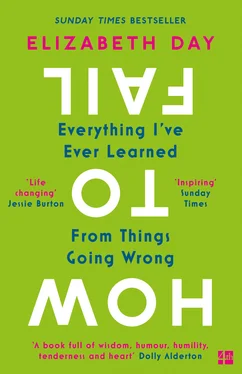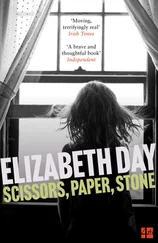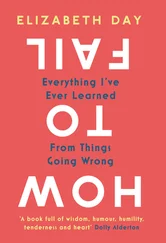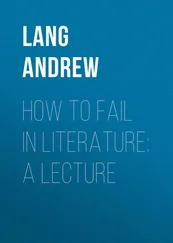Most of the time, celebrities were nice to me. Pierce Brosnan and his wife were absolutely lovely when I met them at a film awards ceremony and I have never forgotten it, even though the entirety of our exchange ran something like this:
Me: ‘So, Pierce, can I ask – who do you think will be the next James Bond?’
Pierce: ‘Oh, you can’t ask me that!’
Pierce Brosnan’s wife: ‘I like your tuxedo.’
Me: ‘OHMIGOD THANK YOU SO MUCH THAT’S SO NICE OF YOU.’
Others were less patient. At a red-carpet film premiere in Leicester Square, I commented on the suaveness of a male actor’s suit as he walked past.
‘I’m here promoting my film and all you can ask about is what I’m wearing?’ he said, spitting out the words in a fit of pique. To which I should have responded, ‘Mate, that’s what women get asked all the time, I’m just levelling the playing field.’ But I didn’t. Instead, I flushed furiously and felt humiliated and left without seeing the film.
The truth was, at the age of twenty-two, I didn’t have enough confidence in myself or my own opinions not to let incidents like this get to me. My sense of self was unmoored, at the mercy of any passing gust of wind. This was the age where my people-pleasing kicked in to a higher gear. Like many young women, I mistakenly thought that the best way of feeling better about myself was to get other people to like me and to attempt to survive on the fumes of their approbation.
For someone who spent her twenties in a series of long-term relationships this was terrible logic. I would contort myself into varying degrees of discomfort simply to fit in with someone else’s life, someone else’s desires. It got to the stage that if a boyfriend asked me where I wanted to go for lunch, I became paralysed by indecision. I didn’t want to tell them where I wanted to go in case they preferred somewhere else. After a few years of this, I genuinely no longer knew what I wanted to eat anyway and so actively needed someone else to make the decision.
I lost myself in the rush to be part of a couple.
As a result, I was scared by the notion of not being in a relationship. The longest I was single between the ages of nineteen and thirty-six was two months. In those two months, I came up with every excuse I could to keep in touch with my ex-boyfriend, and simultaneously tried to distract myself by saying yes to any man who crossed my path and expressed even the mildest interest (years later, when I told a male friend of mine about this period in my life, he replied with ‘Fuck. I wish I’d known you had no standards back then,’ which wasn’t exactly what I meant, but it wasn’t far off either).
During these eight weeks, I engineered the least spontaneous one-night stand in the history of random hook-ups, purely because I believed that having a one-night stand was exactly the sort of thing I should be experiencing in my twenties.
The man in question was called Mike and lived in Paris but had come to London for the weekend. We spent an evening eating overly complicated Chinese food served on wooden platters and then we danced in a terrible basement club off Oxford Street that only played salsa music and had stains on the walls that looked like faecal matter. Mike was perfectly nice but had the unfortunate quality of becoming less attractive the more time I spent with him because he said things like ‘Golly gosh’ and ‘Is that the time? Best be getting on then.’ But so intent was I on having this much-lauded sexual experience of no-strings-attached, shirt-rippingly intense bodily contact with a near-stranger, that I insisted on going back to his hotel and falling into bed with him. It was, hands-down, the worst sex of my life. At one point, I had to ask ‘Are you in?’ because amidst the fumbling-golly-gosh embarrassment of it all I honestly couldn’t tell.
As soon as it was over (he had, it turned out, been ‘in’) I gathered up my clothes, locked myself in the bathroom and got dressed.
‘You’re not staying then?’ he asked plaintively when I emerged.
‘No … erm … deadlines … so sorry … lovely evening …’ I said, backing out of the door like a faithful retainer leaving an audience with the Queen. ‘Speak soon!’
Outside, I took out my phone and called my ex-boyfriend. He answered and said he was missing me. We met the next day and got back together. We went out for another year.
As I walked to the tube in the early hours of that particular morning, I reflected that I had tried my best to live out the fantasy of my twenties, to experience the heady whirl of irresponsible youth and casual sex, and yet, when it came down to it, I’d rather be in a steady relationship and have a bath and an early night.
It felt like an extended metaphor for the whole decade: that shifting tension between where you wanted to be, where you thought you should be and where you were right now.
It was the same with work. The Londoner’s Diary was great training for spotting a story and writing it to deadline, but I was desperate to be getting on with the business of being a ‘proper’ journalist.
I was in a job in the area I most wanted to have a career – journalism – but it wasn’t the one I was really after, and it would take me several more years to get there.
I was in a long-term relationship that wasn’t serious enough to lead to marriage and wasn’t fun enough to be casual.
I was in a house-share that, on paper, should have been a place of hedonistic excess but was mostly just a nice terrace inhabited by people who reminded each other of the need to buy toilet roll and made tray-bake brownies from Nigella’s latest cookbook when they had a spare couple of hours on a Sunday.
It didn’t help that there was so much cultural baggage around one’s twenties. When this particular decade was represented on screen, it looked as if everyone else was having a fabulous time. The mood music of my twenties was provided by the Friends theme tune and the clatter of Sex and the City heels on New York sidewalks. But it never translated into real life. The rest of us who didn’t hang out with their closest pals in Central Perk coffee shop or drink Cosmopolitans and discuss the female orgasm were left labouring under the misapprehension that we were failing to make the most of it.
I remember my twenties being a decade in which no one talked – not really, not honestly – about the things they felt unhappy about or the stuff that was going wrong in their lives. It was, instead, ten years of trying to put on a good show – for yourself and for anyone else who might be watching. It was ten years of moving forwards while groping blindly for the point of it all; ten years of building a career but feeling impatient at the lack of pace; ten years of wondering who you were meant to be dating and how you would find the mythical right ‘one’; ten years of casually assuming you had all the time in the world while knowing you were running out of it, to the extent that turning thirty seemed to me to be a giant cut-off after which I would never be truly young again.
One of the most interesting revelations that came from the How To Fail podcast was how many other people struggled with this period of their life. I’d assumed that my interviewees would have nightmare tales to tell of adolescence (I’d been preternaturally well behaved as a teenager, and I expected others to have misbehaved for me) but actually, it was their twenties that came up again and again as a time of immense transition and uncertainty. Unlike me, who had been lucky enough to know what I wanted to do professionally, many of those I spoke to had had little idea of what their future held, and that brought its own challenges.
The writer Olivia Laing chose the entirety of her twenties as one of her failures, because she dropped out of university.
Читать дальше












